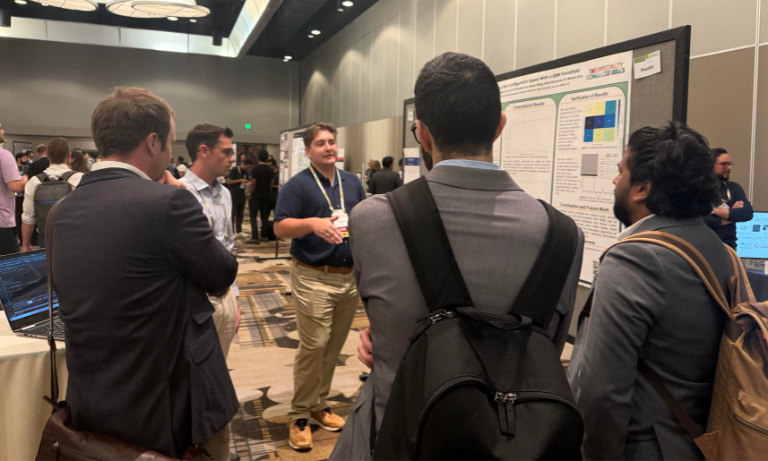When Cindy Shurtleff started studying metallurgical engineering at Cal Poly, she joined a tight-knit group of aspiring engineers and supportive professors who have stayed connected for close to 50 years.
Shurtleff was admitted to Cal Poly in 1975, transferred from chemistry to engineering and became the first female to graduate from the Metallurgical Engineering Department – now called Materials Engineering – in 1980.
The Washington state resident looks back at the years she was cheered by faculty members invested in her success and classmates with whom she forged lifelong friendships as a critical juncture on her road to a life of adventure.
“Cal Poly Engineering was there at a formative time of my life and helped me become the adult that I am – an independent woman,” she said. “I could go back to campus any time and be welcomed back. It feels like home.”
To ensure the concept of ‘family’ stays at the heart of the Materials Engineering Department, Shurtleff recently donated $1 million to the department’s discretionary fund for projects and people that can positively shape students the way she was.
“The impact of Cindy’s gift is profound,” said department Chair Trevor Harding. “It provides the resources needed to sustain the family-like atmosphere in MATE through social events, the R.C. Wiley Plaza and book clubs. It also helps us to keep our laboratories up to date, which impacts all MATE students, current and future.”

Spelling Success
Shurtleff, then Garretson, paints a picture of her time in the fledgling Metallurgical Engineering Department, where a small number of students took classes in an old weld shop – a building and experience they claimed as their own.
“We were together the whole time. We went to the same classes, socialized together and all bought motorcycles,” said Shurtleff, adding she cruised around campus on her own 50cc motorcycle. “It was like joining a fraternity.”
Professors were committed to helping students learn the science of metals and become well-balanced engineers, Shurtleff said, with one even giving his senior-level spelling tests to teach them the terminology of their industry.
“When you have professors watching you and showing they care about you, that makes you want to do your best,” Shurtleff said.
Shurtleff had nine job offers upon graduating, ultimately accepting a position as a metallurgical engineer at Raychem Corp., one of the world’s largest producers of industrial electronics components, serving industries including aerospace, automotive, consumer electronics and medical.
Along the way, Shurtleff obtained a master’s degree at Stanford University and moved into product marketing, continuing her work in the field after moving to Seattle with husband Rob, who had a long career with Microsoft Corp.
Shurtleff left the workforce to raise her two children, Kyle and Katie, and dove into volunteer work in her community, schools and nonprofit organizations including the Washington Women’s Foundation.
She also traveled the world, visiting 96 U.N. countries to gain a better understanding of global issues and taking her children on many trips and adventures.
“It’s important for them to understand their place in the world,” she explained.

Giving Back
Shurtleff rejoined her classmates on campus last year for the department’s 60th anniversary celebration and dedication of a sculpture designed and constructed by Steve Patterson (‘80) with help from Bob Adams (‘81) to honor the department’s first chair – Richard C. Wiley.
The sculpture, “Atom Shifter,” was installed in the R.C. Wiley Memorial Plaza, outside the Brown Engineering Building, with new tables and chairs funded by Shurtleff and other alumni to give students a place to gather and build their own community.
Shurtleff’s $1 million donation, payable over 10 years, also has financed three book clubs for MATE students to discuss issues at the intersection of materials science and society; social events including a pumpkin carving for Halloween and MATEsgiving; an advanced 3D printer for composite materials; and renovations of the electron microscopy facility.
Additionally, the donation has covered travel expenses for Harding’s trip to the University of Birmingham, where he discussed possibilities for a study abroad program specific to materials engineering students so they wouldn’t have to spend extra time at Cal Poly before graduating.
“I wanted to make a large and meaningful gift to Cal Poly that allows the department to enhance the student experience both inside and outside the classroom,” Shurtleff said. “This gift can help students have a similar experience to the one I had.”
Harding said the discretionary nature of the donation gives the department flexibility to best use the funds.
Bolstering the department’s core was critical for Shurtleff, who said, “It’s easy to make grants or gifts to a project, but all departments need funding for their core business, and it’s hard to ask for that.”
Shurtleff has retired from full-time philanthropy but fills her days with myriad activities – hiking, helping a youth ski team near her home, advocating for land preservation, playing competitive squash, learning Italian and, of course, traveling.
The self-professed speed demon still has a motorcycle – a Yamaha TW200 – but after a rib-breaking crash, she decided to stick to her electric mountain bike.
“I have a full, wonderful life,” she said. “I am where I am because Cal Poly gave me the confidence to be independent, and an engineering degree was the ticket to that independence. I did not waste my technical degree; I just used it in different ways.”

To support MATE:
Your donation to the Materials Engineering Department can make a big difference, too. Please consider making a gift here.
By Emily Slater


